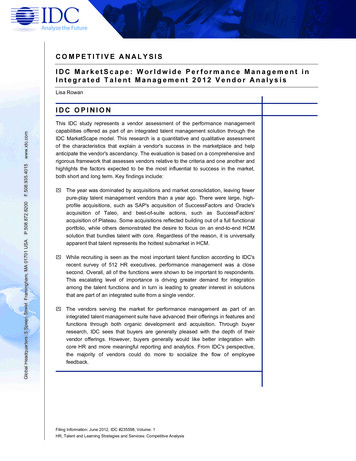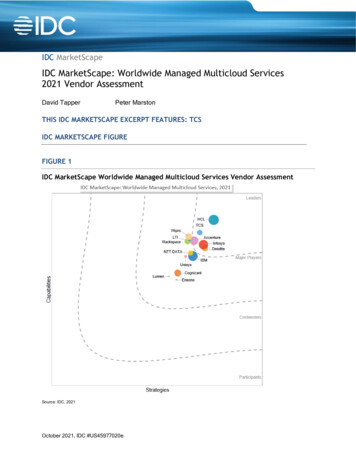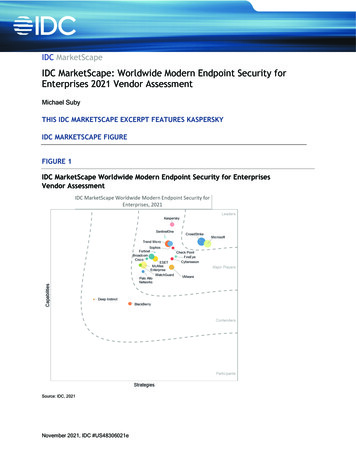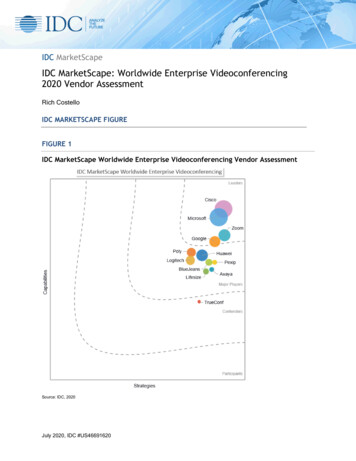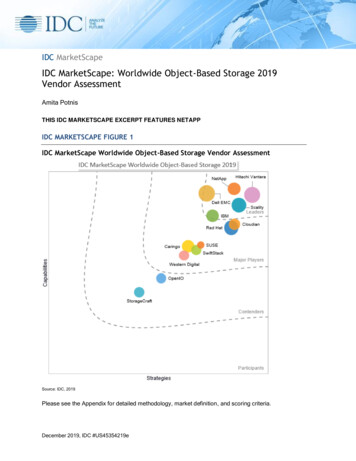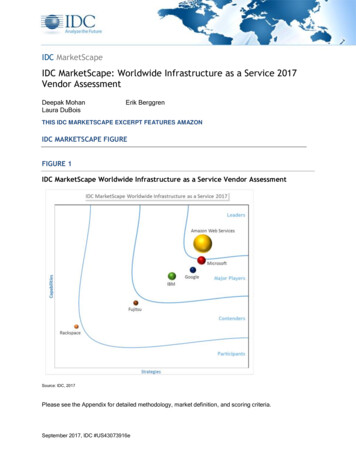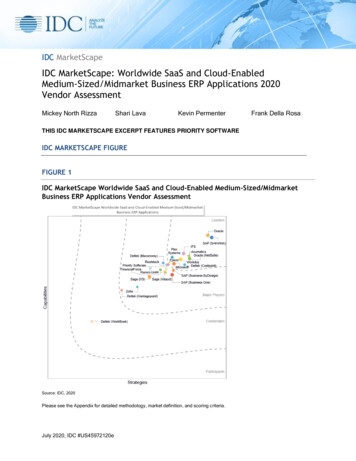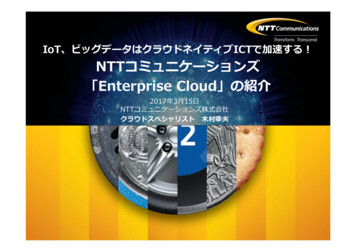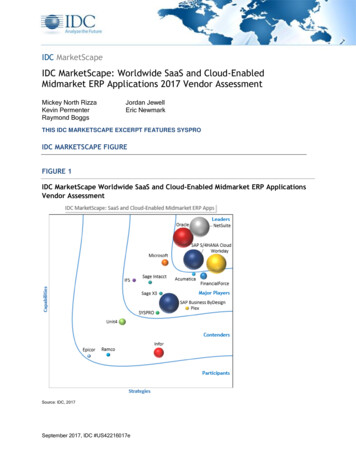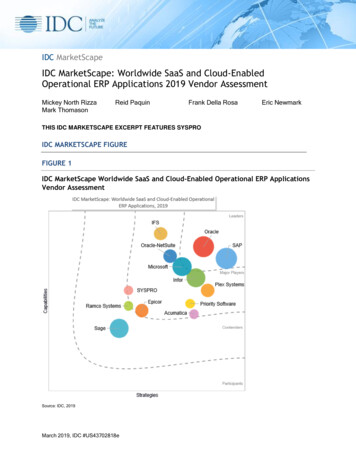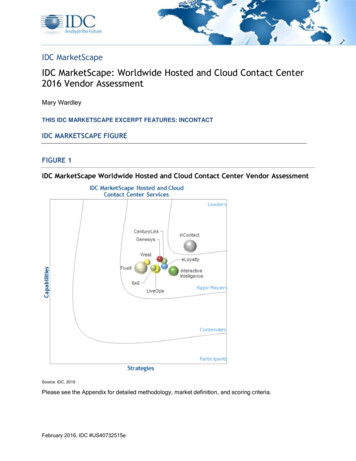
Transcription
IDC MarketScapeIDC MarketScape: Worldwide Hosted and Cloud Contact Center2016 Vendor AssessmentMary WardleyTHIS IDC MARKETSCAPE EXCERPT FEATURES: INCONTACTIDC MARKETSCAPE FIGUREFIGURE 1IDC MarketScape Worldwide Hosted and Cloud Contact Center Vendor AssessmentSource: IDC, 2016Please see the Appendix for detailed methodology, market definition, and scoring criteria.February 2016, IDC #US40732515e
IN THIS EXCERPTThe content for this excerpt was taken directly from IDC MarketScape: Worldwide Hosted and CloudContact Center 2016 Vendor Assessment (Doc #US40732515). All or parts of the following sectionsare included in this excerpt: IDC Opinion, IDC MarketScape Vendor Inclusion Criteria, EssentialGuidance, Vendor Summary Profile, Appendix and Learn More. Also included is Figure 1.IDC OPINIONThis IDC study presents a vendor assessment of the hosted and cloud contact center services marketthrough the IDC MarketScape model. This assessment discusses both quantitative and qualitativecharacteristics that explain success in this market. The evaluation is based on a comprehensive andrigorous framework that assesses vendors relative to the criteria and highlights the factors expected tobe the most influential for success in the market in both the short term and the long term. The cloudcontact center (CCC) services market is growing and maturing quickly. IDC estimates that U.S.spending on hosted contact center (HCC) services will increase at a CAGR of 10.8% until 2019.Consumer communication preferences and demands and contact center buyers' needs for greaterefficiency and flexibility are forces driving growth in this market. In summary: Organizations are challenged to deliver a consistent multichannel experience. In IDC's 2016EXPERIENCES Survey, organizations identified that the key factor in achieving a superiorcustomer experience was delivering a consistent customer experience across multiplecommunications channels. Unfortunately, this response was also the top challenge indelivering a superior customer experience (see IDC's 2015 EXPERIENCES Survey: TheChallenges and Key Factors in Achieving Superior Customer Experiences, IDC#US40343915, December 2015). Consumers have a greater breadth of communication channels and higher expectations. Therise of digital communications — in particular, consumers' desire to interact via social andmobile — is driving hosted and cloud contact center services. As enterprises aim to keep upwith rapidly changing customer preferences, hosted and cloud contact center solutions offerquicker access to new channels as customers demand support on these channels. However,IDC consumer survey data shows that the majority of customers are dissatisfied with thebreadth of channels available to interact with companies they do business with (see 2014 U.S.Consumer Communication Preferences Study Results, IDC #253705, January 2015). Cost efficiency and flexibility are driving cloud contact center growth. Reducing costsconsistently comes up at the top of corporate imperatives in IDC demand-side surveys.Companies are looking to do more with less and expecting service providers to be nimble andflexible in delivering services that keep up with the pace of change in business, in particular asit relates to customer interactions (see 2014 U.S. Business Process Outsourcing Buyer StudyResults Customer Care BPO Responses, IDC #250194, July 2014). In addition, according toIDC demand-side data, a majority of companies are "using or evaluating a hosted or cloudsolution for their contact center." End-consumer demands combined with a need for speed,flexibility, and cost reduction are all driving companies to evaluate hosted and cloud solutions. 2016 IDC#US40732515e2
IDC MARKETSCAPE VENDOR INCLUSION CRITERIAThis study includes an analysis of nine worldwide vendors selling hosted and cloud-based contactcenter services to end users and service providers. In this study, IDC included global vendors active inseveral countries with direct sales or indirect partner strategies.Hosted and cloud contact center services automate functions related to customer service andcustomer experience. These services include a customer service representative (CSR) or an agentdesktop interface, management, administration, and analytics. Services in this category are automaticcall distribution (ACD), predictive dialing, telephony integration, universal queuing, administration andmanagement applications, and desktop clients. Basic capabilities of the vendor offering should includeautomatic lead selection or lead intended to improve efficiency, for both inbound and outbound calls tobe directly routed to the appropriate agent for the task, minimizing wait times for people calling in, butthey may include other types of customer contact as well, including email, Web chat, and mobile textmessaging. The solution also provides the ability to generate historical reports and supervisorycapabilities.The nine worldwide hosted and cloud contact center vendors profiled in this study are: 8x8 CenturyLink eLoyalty Five9 Genesys inContact Interactive Intelligence LiveOps WestESSENTIAL BUYER GUIDANCEIDC research indicates that while the majority of companies are still using on-premise contact centersolutions, the majority of companies are also either using or evaluating a hosted or cloud contactcenter service. According to IDC's 2014 Customer Care BPO Demand-Side Survey, 39% ofrespondents were using a hosted or cloud service and 38% of respondents were evaluating a hostedor cloud service. Only 23% of respondents were using an on-premise system and not evaluating ahosted or cloud model.Hosted and cloud contact center services can include any number of the following capabilities: ACD,IVR, skills-based routing, speech recognition, reporting and metrics tools, CTI and CRM capabilitiesand/or integration, workforce management, online recruiting and training platforms, and othercapabilities that support contact centers and customer care processes. Often, much of the functionalityis optional and/or provided through partnerships. These services are often the platform for supportingcommunication with end customers on many channels, including phone, email, chat, and social media.As consumers continue to have greater expectations with communicating with companies andenterprises continue to demand speed, flexibility, and cost reduction, hosted and cloud contact center 2016 IDC#US40732515e3
services must continue to evolve. Customers of hosted and cloud contact center services shouldevaluate their potential provider with the following in mind: Partner with providers that have appropriate sales force structures and support. Therequirements of consumers of contact center capabilities vary widely depending on whetherthe company is an SMB, a large organization, or in a specific vertical. Providers arerecognizing this fact and are in many instances reorganizing to address the unique needs thatthese different classes of organizations require. Seek validation through case studies,reference accounts, and the partner ecosystem that your provider has a track record withorganizations of your size or classification. In addition, the hosted model affords providers theopportunity to demonstrate their specific capability easily with a sample of your own data. Select providers that study consumer channel trends and prepare for the future. In the past 10–15 years, contact center providers have covered what has become the basics (voice, email,and chat). However, social and mobile are on the rise. As organizations move to incorporatethese capabilities within their environments, they are forced to add the services or functionalityon top of existing systems. As the demand for social and mobile as customer care channelsbecomes increasingly mainstream, it is important for these capabilities to be part of the overallsolution set. Understanding and analyzing these trends will be very important for contactcenter services providers to deliver for the customers of the future. Ensure a value proposition complementary to CRM. It is essential to creating a seamlesscustomer experience so that information between CRM systems and the contact center workswell together. The contact center should be a system of engagement to augment CRM, whichis traditionally a system of record. This means that cloud contact center providers must haveCRM capabilities and/or easily integrate with leading CRM systems. This will further enablethe clarity of contextual information and allow for a more personalized experience. Help customers be able to design journeys for their customers. As the contact center becomesthe primary system of engagement for customers of the enterprise, it plays an important role inthe way that customers experience the brands. Cloud contact center services providers mustensure that the features provided are able to help their buyers design how that experienceshould be for their customers.VENDOR SUMMARY PROFILESThis section briefly explains IDC's key observations resulting in a vendor's position in this IDCMarketScape. While every vendor is evaluated against each of the criteria outlined in the Appendix,the description here provides a summary of each vendor's strengths and challenges.inContactinContact, a public company based in Salt Lake City, Utah, was formed in 1997 as a reseller oftelecommunications services. It began offering cloud software solutions to the contact center market in2005 and now serves about 1,050 customers representing about 155,000 seats with hosted contactcenter and customer experience solutions.inContact (Nasdaq: SAAS) has two business segments — software and network connectivity. Thesoftware segment includes software and services related to its cloud-based contact center platform.The network connectivity segment encompasses voice and data services. The software segmentmade up 59% of inContact's revenue in 2014 and grew 46% compared with 2013. 2016 IDC#US40732515e4
In May 2014, inContact acquired CallCopy (aka Uptivity) for cash and stock valued at 48.9 million.CallCopy was a provider of a midmarket workforce optimization software and services to call centers,encompassing speech and desktop analytics, agent coaching, call and desktop recording, and quality,performance, workforce management, and satisfaction surveys.inContact is a Leader in the 2016 Hosted and Cloud Contact Center IDC MarketScape. IDC evaluatedinContact's Cloud Call Center Platform for this study.StrengthsinContact assessed well in the Hosted and Cloud Contact Center IDC MarketScape in both thestrategies and the capabilities categories. Among the strategies categories in which inContact was wellrated were: Functionality. inContact provides solutions to support multimedia contact center interactions,complex routing, and workforce optimization. inContact's CCC offering includes ACD, IVR,Personal Connection Outbound, and a complete workforce optimization suite in the cloud. Delivery model. inContact is delivered as a highly scalable, multitenant platform that supportscontact centers and agents located around the world. Scalability. inContact provides true multitenant cloud built on a global, carrier-gradeinfrastructure, with guaranteed 99.99% uptime. Customers get on-demand scalability to meetplanned and unplanned fluctuations in call volumes, paying only for actual usage.Among the capabilities categories, inContact was rated well in all the offering and go-to-marketcategories. More specifically: Portfolio of benefits delivered. It includes integrations with CRM and unified communications,analytics, workforce optimization, network connectivity, and professional services/consulting.Customers indicated a high level of satisfaction when asked about pricing and whether the servicehelped improve customer experience, improve agent experience, drive innovation, manage risk,improve efficiency, and reduce costs. Customers indicated they were very likely to increase spendingin the next 6—18 months with inContact and would recommend it to both internal and externalexecutives.Among the strengths cited by customers were integration of new offerings that worked well withexisting products and inContact's voice/network infrastructure.ChallengesinContact had no significant weaknesses in our assessment. The company was rated average in thebusiness capabilities categories — growth strategy execution, innovation, and employee management.Customers asked for inContact to provide more technical people to handle first-level support calls andmore subject matter experts for higher-level support calls, chat/email, and reporting/dashboards.APPENDIXReading an IDC MarketScape GraphFor the purposes of this analysis, IDC divided potential key measures for success into two primarycategories: capabilities and strategies. 2016 IDC#US40732515e5
Positioning on the y-axis reflects the vendor's current capabilities and menu of services and how wellaligned the vendor is to customer needs. The capabilities category focuses on the capabilities of thecompany and product today, here and now. Under this category, IDC analysts will look at how well avendor is building/delivering capabilities that enable it to execute its chosen strategy in the market.Positioning on the x-axis, or strategies axis, indicates how well the vendor's future strategy aligns withwhat customers will require in three to five years. The strategies category focuses on high-leveldecisions and underlying assumptions about offerings, customer segments, and business and go-tomarket plans for the next three to five years.The size of the individual vendor markers in the IDC MarketScape represents the market share of eachindividual vendor within the specific market segment being assessed.IDC MarketScape MethodologyIDC MarketScape criteria selection, weightings, and vendor scores represent well-researched IDCjudgment about the market and specific vendors. IDC analysts tailor the range of standardcharacteristics by which vendors are measured through structured discussions, surveys, andinterviews with market leaders, participants, and end users. Market weightings are based on userinterviews, buyer surveys, and the input of a review board of IDC experts in each market. IDC analystsbase individual vendor scores, and ultimately vendor positions on the IDC MarketScape, on detailedsurveys and interviews with the vendors, publicly available information, and end-user experiences inan effort to provide an accurate and consistent assessment of each vendor's characteristics, behavior,and capability.Market DefinitionHosted contact center services vendors manage the technology environment on behalf of theircustomers on either a dedicated (single-tenant) or a shared (multitenant) basis. Technologies providedcan include but are not limited to the following: ACD, IVR, CTI, and desktop CRM. This segmentaddresses management and hosting of the technology only and does not include management of theprocess or agents.Often, much of the functionality is optional and/or provided through partnerships. These services areoften the platform for supporting communication with end customers on many channels, includingphone, email, chat, and social media.LEARN MORERelated Research Cloud Contact Center Services Profile: LiveOps (IDC #255179, April 2015) Hosted Contact Center Services Profile: West Corp. (IDC #254314, March 2015) IDC's Worldwide Services Taxonomy, 2015 (IDC #254824, March 2015) 2014 U.S. Consumer Communication Preferences Study Results (IDC #253705, January2015) Market Analysis Perspective: Customer Care BPO, 2014 (IDC #253150, December 2014) 2014 U.S. Business Process Outsourcing Buyer Study Results Customer Care BPOResponses (IDC #250194, July 2014) 2016 IDC#US40732515e6
Worldwide and U.S. Outsourced Customer Care Services 2014–2018 Forecast (IDC #248257,May 2014) 2014 U.S. Business Process Outsourcing (BPO) Buyer Study Results (IDC #248275, May2014) U.S. Hosted and On-Demand Contact Center Services 2014–2018 Forecast: CustomerExperience Driving Contact Center Interactions to the Cloud (IDC #246546, February 2014)SynopsisThis IDC study presents a vendor assessment of the hosted and cloud contact center services marketthrough the IDC MarketScape model. The assessment discusses both quantitative and qualitativecharacteristics that explain success in this market. The evaluation is based on a comprehensive andrigorous framework that assesses vendors relative to the criteria and highlights the factors expected tobe the most influential for success in the market in both the short term and the long term."Customer centricity is a driving force in organizations seeking differentiation in markets increasinglyseparated from face-to-face interactions such as social media, digital commerce, and other onlineactivities," says Mary Wardley, research vice president, CRM Applications and Customer Experienceat IDC. "The buyers of hosted and cloud-based contact center products have an opportunity to rapidlydeploy technologies that directly impact their customer-handling models to achieve the requiredmarket differentiation through service." 2016 IDC#US40732515e7
About IDCInternational Data Corporation (IDC) is the premier global provider of market intelligence, advisoryservices, and events for the information technology, telecommunications and consumer technologymarkets. IDC helps IT professionals, business executives, and the investment community make factbased decisions on technology purchases and business strategy. More than 1,100 IDC analystsprovide global, regional, and local expertise on technology and industry opportunities and trends inover 110 countries worldwide. For 50 years, IDC has provided strategic insights to help our clientsachieve their key business objectives. IDC is a subsidiary of IDG, the world's leading technologymedia, research, and events company.Global Headquarters5 Speen StreetFramingham, MA 01701USA508.872.8200Twitter: @IDCidc-insights-community.comwww.idc.comCopyright NoticeThis IDC research document was published as part of an IDC continuous intelligence service, providing writtenresearch, analyst interactions, telebriefings, and conferences. Visit www.idc.com to learn more about IDCsubscription and consulting services. To view a list of IDC offices worldwide, visit www.idc.com/offices. Pleasecontact the IDC Hotline at 800.343.4952, ext. 7988 (or 1.508.988.7988) or sales@idc.com for information onapplying the price of this document toward the purchase of an IDC service or for information on additional copiesor Web rights.Copyright 2016 IDC. Reproduction is forbidden unless authorized. All rights reserved.
Five9 Genesys inContact Interactive Intelligence LiveOps West ESSENTIAL BUYER GUIDANCE IDC research indicates that while the majority of companies are still using on-premise contact center solutions, the majority of companies are also either using or evaluating a hosted or cloud contact center service.
